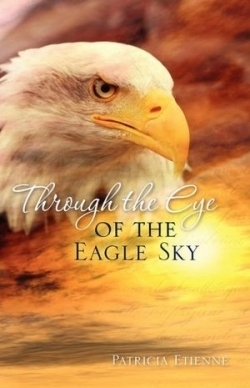Through the eye of the Eagle Sky
If life is a game, then curveballs come out of nowhere and storms threaten even the brightest days. Patricia Etienne’s collection of twenty poems and two short stories chronicles the pursuit of happiness in a world filled with tragedy. It centers on protagonists who fight to pick up the pieces when trust is broken and happiness is stolen. Etienne advises an “all is not lost” attitude. She encourages people to open their eyes and ears to what is going on around them—enlightenment is the name of the game.
Etienne’s strength is character development. The short stories feature likable, if flawed, characters. “The Battered Scarecrow” features a protagonist named Katherine who slowly comes to the realization that her husband, Patrick, is cheating on her. When Katherine finally confronts him, an argument ensues. With one wrong move, Patrick suffers a freak injury, and Katherine’s world is turned upside down. The second story, “When Black Smoke Invades,” sees twenty-nine-year-old Angela fired from her job and abandoned by her boss-lover. Both stories are about what happens when the storm approaches, and how the characters pick themselves up again after tragedy pierces their worlds.
The twenty poems in this collection are not nearly as well-defined as the short stories. They are, however, filled with equal passion. There are some moments of sharp wisdom in Etienne’s poems. “A Dismantle Cradle” includes the vivid declaration, “We sometimes get struck by our destiny.” It is in lines like this where the reader can perhaps hear “the cry of the eagle sky.”
On the other hand, the poems are sometimes statements of the obvious. This excerpt from “My Life” is a prime example: “But life wouldn’t be life / Without its injuries.” The poems lack the subtlety of the short stories, and they need their own protagonists to give them meaning. The result is that the poems—notwithstanding the offer of a few bright moments—do not have near the impact of the short stories.
Through the eye of the Eagle Sky asks us to open our eyes to the bones hanging behind us, to point the finger away from others and toward ourselves. The common thread throughout this collection seems to be that the broken need to be mended, and that this can happen only if we expand our view to include all the possibilities the world has to offer.
Reviewed by
Lisa Bower
Disclosure: This article is not an endorsement, but a review. The publisher of this book provided free copies of the book and paid a small fee to have their book reviewed by a professional reviewer. Foreword Reviews and Clarion Reviews make no guarantee that the publisher will receive a positive review. Foreword Magazine, Inc. is disclosing this in accordance with the Federal Trade Commission’s 16 CFR, Part 255.

